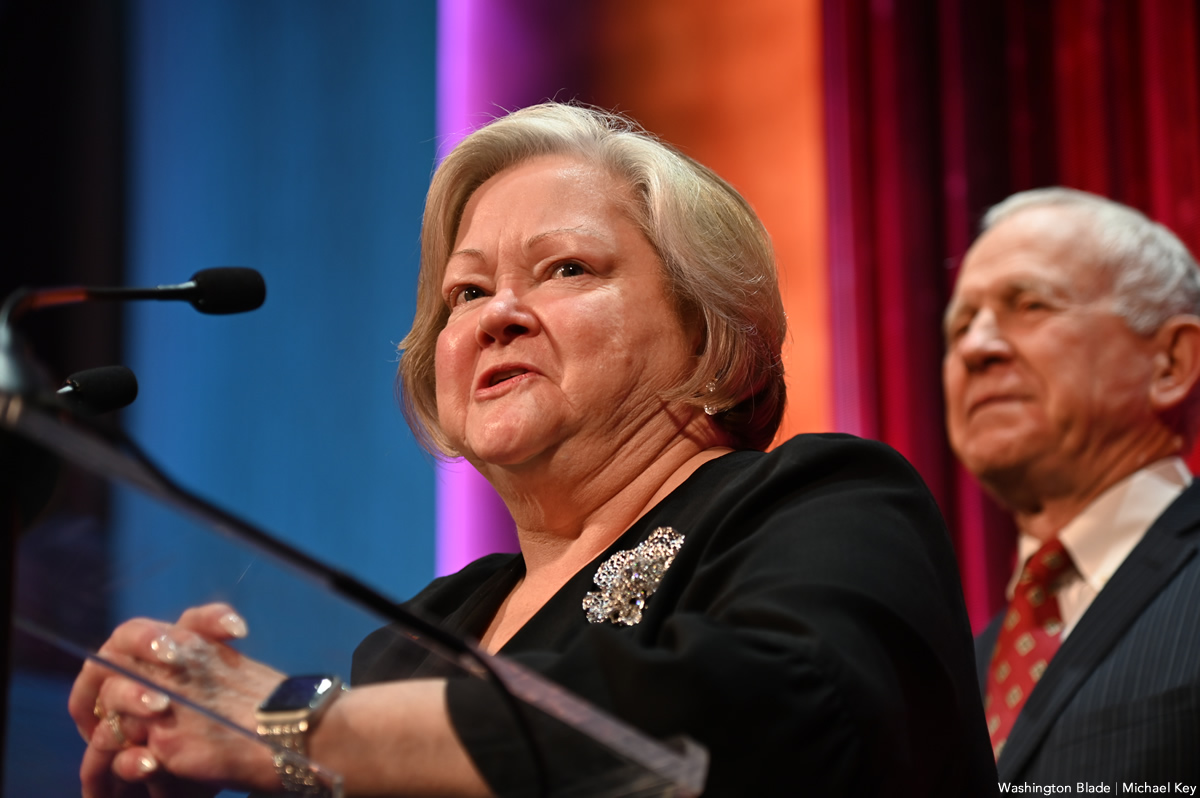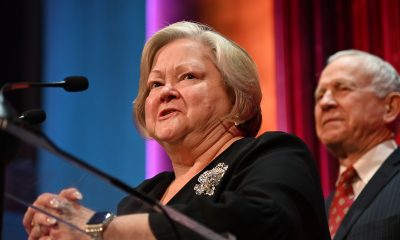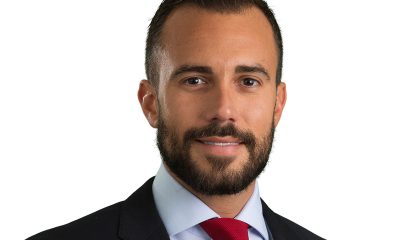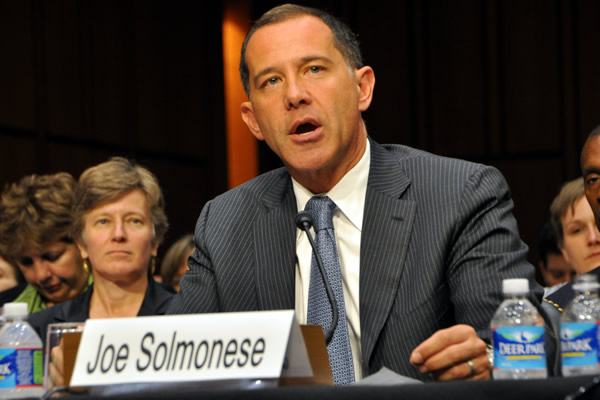National
Solmonese to step down as head of HRC
Source denies reports of sweeping shakeup

Joe Solmonese, who has served for more than six years as president of the Human Rights Campaign, the nation’s largest LGBT civil rights advocacy group, will step down from his job when his current contract ends on March 30, 2012, HRC officials announced last week. The news of Solmonese’s departure was first reported by Pam’s House Blend.
In a statement released Aug. 27, co-chairs of the board of directors of HRC and its sister organization, the HRC Foundation, said Solmonese will remain as head of both organizations “until the completion of his contract to ensure a smooth leadership transition.”
They also announced the formation of a search committee for Solmonese’s replacement to be co-chaired by board members Joni Madison of North Carolina and Dana Perlman of Los Angeles.
“Joe Solmonese is an outstanding leader,” said Anne Fay, who co-chairs the HRC Foundation board. “While we will miss his extraordinary leadership, we enter this next phase, thanks to Joe, in the best place the organization has ever been. Not only has our community secured historic victories, but our membership is larger and more active than any time in our history, and our financial health is secure even in these difficult economic times.”
HRC spokesperson Michael Cole-Schwartz said the combined revenue for HRC and the HRC Foundation for the fiscal year ending March 31, 2011 was $39.8 million. He said the two groups have about 150 employees.
Sources familiar with HRC have speculated that several LGBT movement leaders would likely emerge as candidates for Solmonese’s replacement, including Chuck Wolfe, executive director of the Gay and Lesbian Victory Fund; Brian Ellner, an HRC consultant who coordinated HRC’s efforts to help pass New York’s same-sex marriage law; Chad Griffin, head of the California-based organization that initiated the lawsuit to overturn Proposition 8; and Sean Maloney, one of former President Bill Clinton’s openly gay White House aides who later worked for former New York Gov. David Paterson.
Solmonese has received mixed reviews by LGBT activists during his tenure as head of HRC, which began in 2005. Disagreements over his and HRC’s policies and activities appear to reflect divisions within the LGBT movement.
Supporters and others familiar with the group say Solmonese has worked well in navigating HRC and its LGBT rights agenda during a hostile Bush administration and during a supportive Obama administration, using behind-the-scenes political skills to prod allies in Congress and the White House to move its agenda forward.
Critics say he and HRC have been too closely aligned with the Democratic Party and Democratic congressional leaders, which they say have failed to adequately advance LGBT legislation, such as the Employment Non-Discrimination Act (ENDA) and LGBT-supportive immigration legislation while Democrats controlled the House of Representatives.
The statement released by the HRC board co-chairs says that under Solmonese’s leadership, HRC expanded its public outreach programs, including the start of its Healthcare Equality Index, which, among other things, assesses the sensitivity of hospitals in caring for LGBT people.
HRC and the HRC foundation launched or expanded other important programs during Solmonese’s tenure, the board statement says, in the area of outreach to religion and faith communities, schools programs promoting fair treatment of LGBT youth, and a family and children initiative to open adoption agencies to LGBT parents.
In the area of legislation, the board statement said Solmonese played a key role in steering HRC’s opposition to the Federal Marriage Amendment, a proposed constitutional ban on same-sex marriage. They also note that under his tenure, Congress passed a hate crimes law with protections for LGBT people and repealed the “Don’t Ask, Don’t Tell” law barring gays from serving openly in the military.
The statement notes that during his tenure, the Obama administration put in place a number of administrative directives and policy changes favorable to LGBT people, including a policy banning discrimination against federal government workers based on gender identity.
Dana Beyer, executive director of the transgender advocacy group Gender Rights Maryland and a former HRC board member, said Solmonese alienated many in the transgender community and in the LGBT community in general in 2007 when he declined to oppose a decision by House Democratic leaders to remove protections for transgender people from ENDA.
Then Speaker of the House Nancy Pelosi (D-Calif.), a longtime supporter of LGBT rights, and Rep. Barney Frank (D-Mass.), who’s gay, said they determined at the time that ENDA couldn’t pass in the House if a transgender provision remained in the bill. The House passed a so-called “gay only” version of the bill that year over strong objections from a coalition of dozens of LGBT groups from across the country. Pelosi and Frank said they would introduce a separate bill with transgender protections at a later date, when support for such a bill could be lined up.
Solmonese said it would have put HRC in an untenable position to oppose a major gay rights bill backed by longtime LGBT rights supporters in the House. The bill died when the Senate did not bring it up for a vote.
Solmonese and HRC changed their position on the bill the following year, saying the organization would no longer support ENDA without a provision protecting transgender people from job discrimination.
But Beyer and other LGBT activists said HRC’s earlier position left deep scars within the transgender community, which felt abandoned by HRC.
Others have said the LGBT movement as a whole was divided over HRC’s position, with many in the movement – including D.C.’s Gay and Lesbian Activists Alliance and the Gertrude Stein Democratic Club – supporting an incremental approach of passing a sexual orientation-only version of ENDA while continuing to push hard for adding a transgender provision as soon as possible.
Those holding that view said they favored a fully inclusive ENDA but recognized such a bill could not pass at the time.
Beyer said that in addition to the ENDA flap, many LGBT activists believe HRC is devoting too much of its resources to marriage equality, including the repeal of the Defense of Marriage Act, at the expense of other legislation, such as a trans-inclusive ENDA. Beyer argues that ENDA would help many more LGBT people than those interested in getting married.
“Many of us are hoping HRC will change its direction on some of these issues under a new president,” she said. “But the president is really nothing more than a reflection of the board of directors,” she said. “If the board of directors doesn’t want to change the direction of the organization, it doesn’t matter who the next president is.”
Richard Socarides, president of the national LGBT advocacy group Equality Matters, said Solmonese has performed well in advancing the LGBT agenda.
“He has been there when some very important gains took place,” he said. “And I think he did a tremendous job building the organization.”
Socarides said he disagrees with some critics who say HRC failed to do enough to push ENDA or is placing too much emphasis on marriage equality.
“I don’t think they can be blamed for the failure to pass any particular piece of legislation just as they can’t take all the credit for the legislation that has passed,” he said.
“But what I have said before is that as an organization, they have not sufficiently leveraged their power to bring about change more quickly,” Socarides said. “They are a key part of the Washington establishment but they seem to seek change within existing structures. They are very reluctant to rock the boat.”
Rick Rosendall, vice president of D.C.’s Gay and Lesbian Activists Alliance, and Bob Summersgill, GLAA’s former president, each said HRC under Solmonese’s leadership has provided strong support for the efforts by D.C. activists in passing a same-sex marriage law. The two said Solmonese also arranged for HRC to devote considerable resources to fight efforts by members of Congress to attach anti-gay riders to the city’s annual appropriations bill. Congress must approve the city’s annual budget under the city’s limited home rule charter.
Summersgill and Rosendall noted that HRC, among other things, helped to line up support to defeat proposals by Republican lawmakers to ban same-sex couples from adopting children in the city.
Lateefah Williams, president of the Gertrude Stein Democratic Club, said she, too, appreciated Solmonese’s support for D.C.’s marriage equality campaign, noting that he directed HRC to provide a full-time field organizer to help local activists build support in the community for the same-sex marriage bill.
Williams said she also shares the views of some that HRC should broaden its support for transgender rights initiatives as well as efforts to support programs aimed at minorities within the LGBT community, such as blacks and Latinos, and youth.
“I wish Joe well,” she said.
News of Solmonese’s departure was first reported by the blog Pam’s House Blend last week. The blog cited unnamed sources as saying his departure may be part of a sweeping staff shakeup initiated by the HRC board and that news of his leaving came about under less than amicable circumstances.
Other sources familiar with HRC told the Blade that account was inaccurate. One source familiar with the group characterized as “complete fiction” claims of a staff shakeup as well as claims by some that HRC may already have lined up a successor for Solmonese.
“This is about as normal and straight forward as it gets,” said the source. “He’s giving them six months advance notice. They’re going to launch a replacement process. The organization will go through that and come out with a successor.”
In a letter to HRC volunteers across the country, Solmonese discussed the timing of his decision to leave the group.
“While there may never be an ideal time, this moment seems right for me and my family,” he said. “In addition to our unprecedented victories, the health and future of the Human Rights Campaign has never been more robust,” he said. “My successor will lead a thriving organization despite the recent economic challenges.”
Federal Government
US Census Bureau testing survey on LGBTQ households
Agency proposing questions about sexual orientation and gender identity

The U.S. Census Bureau is seeking public comment on a proposed test of sexual orientation and gender identity questions on the American Community Survey. The test would begin this summer and continue into next year.
The Census Bureau published the request as a Federal Register notice. In its press release the agency noted that the ACS is an ongoing survey that collects detailed housing and socioeconomic data. It allows the Census Bureau to provide timely and relevant housing and socioeconomic statistics, even for low levels of geography.
As part of the process for adding new questions to the ACS, the Census Bureau tests potential questions to evaluate the quality of the data collected.
The Census Bureau proposes testing questions about sexual orientation and gender identity to meet the needs of other federal agencies that have expressed interest in or have identified legal uses for the information, such as enforcing civil rights and equal employment measures.
The test would follow the protocols of the actual ACS — with one person asked to respond to the survey on behalf of the entire household. These particular questions are asked about people 15 years of age or older. Households are invited to respond to the survey online, by paper questionnaire or by phone.
The current Federal Register notice gives the public a final opportunity to provide feedback before the Census Bureau submits its recommendations to the Office of Management and Budget for approval. The public may provide feedback through May 30 online.
The White House
Judy Shepard to receive Presidential Medal of Freedom
Nancy Pelosi is also among this year’s honorees

Beloved LGBTQ advocate Judy Shepard is among the 19 honorees who will receive the Presidential Medal of Freedom, the highest civilian award in the U.S., the White House announced on Friday.
The mother of Matthew Shepard, who was killed in 1998 in the country’s most notorious anti-gay hate crime, she co-founded the Matthew Shepard Foundation with her husband Dennis to raise awareness about anti-LGBTQ violence.
The organization runs education, outreach, and advocacy programs, many focused on schools.
In a statement shared via the Human Rights Campaign, Shepard said, “This unexpected honor has been very humbling for me, Dennis, and our family. What makes us proud is knowing our President and our nation share our lifelong commitment to making this world a safer, more loving, more respectful, and more peaceful place for everyone.
“I am grateful to everyone whose love and support for our work through the years has sustained me.
“If I had the power to change one thing, I can only dream of the example that Matt’s life and purpose would have shown, had he lived. This honor reminds the world that his life, and every life, is precious.”
Shepard was instrumental in working with then-President Barack Obama for passage of the landmark Matthew Shepard and James Byrd Jr. Hate Crimes Prevention Act in 2009, which was led in the House by then-Speaker Nancy Pelosi (D-Calif.), who will also be honored with a Presidential Medal of Freedom during the ceremony on Friday.
Also in 2009, Shepard published a memoir, “The Meaning of Matthew: My Son’s Murder in Laramie, and a World Transformed,” and was honored with the Black Tie Dinner Elizabeth Birch Equality Award.
“Judy Shepard has been a champion for equality and President Biden’s choice to honor her with the Presidential Medal of Freedom is a testament to what she’s done to be a force of good in the world,” HRC President Kelley Robinson said in a statement.
“A mother who turned unspeakable grief over the loss of her son into a decades-long fight against anti-LGBTQ+ hatred and violence, Judy continues to make a lasting impact in the lives of the LGBTQ+ community,” she said.
“It is because of her advocacy that the first federal hate crimes legislation became law and that countless life-saving trainings, resources and conversations about equality and acceptance are provided each year by the Matthew Shepard Foundation,” Robinson said. “We are honored that Judy is a member of the HRC family and know that her work to create a more inclusive and just world will only continue.”
Other awardees who will be honored by the White House this year are: Actor Michelle Yeoh, entrepreneur and former New York Mayor Michael Bloomberg, Jesuit Catholic priest Gregory Boyle, Assistant House Democratic Leader Jim Clyburn (D-S.C.), former Labor and Education Secretary and former U.S. Sen. Elizabeth Dole (R-N.C.), journalist and former daytime talkshow host Phil Donahue, World War II veteran and civil rights activist Medgar Evers (posthumous), former Vice President Al Gore, civil rights activist and lawyer Clarence B. Jones, former Secretary of State and U.S. Sen. John Kerry (D-Mass.), former U.S. Sen. Frank Lautenberg (D-N.J.) (posthumous), Olympic swimmer Katie Ledecky, educator and activist Opal Lee, astronaut and former director of NASA’s Johnson Space Center Ellen Ochoa, astronomer Jane Rigby, United Farm Workers President Teresa Romero, and Olympic athlete Jim Thorpe (posthumous).
National
United Methodist Church removes 40-year ban on gay clergy
Delegates also voted for other LGBTQ-inclusive measures

The United Methodist Church on Wednesday removed a ban on gay clergy that was in place for more than 40 years, voting to also allow LGBTQ weddings and end prohibitions on the use of United Methodist funds to “promote acceptance of homosexuality.”
Overturning the policy forbidding the church from ordaining “self-avowed practicing homosexuals” effectively formalized a practice that had caused an estimated quarter of U.S. congregations to leave the church.
The New York Times notes additional votes “affirming L.G.B.T.Q. inclusion in the church are expected before the meeting adjourns on Friday.” Wednesday’s measures were passed overwhelmingly and without debate. Delegates met in Charlotte, N.C.
According to the church’s General Council on Finance and Administration, there were 5,424,175 members in the U.S. in 2022 with an estimated global membership approaching 10 million.
The Times notes that other matters of business last week included a “regionalization” plan, which gave autonomy to different regions such that they can establish their own rules on matters including issues of sexuality — about which international factions are likelier to have more conservative views.
Rev. Kipp Nelson of St. Johns’s on the Lake Methodist Church in Miami shared a statement praising the new developments:
“It is a glorious day in the United Methodist Church. As a worldwide denomination, we have now publicly proclaimed the boundless love of God and finally slung open the doors of our church so that all people, no matter their identities or orientations, may pursue the calling of their hearts.
“Truly, all are loved and belong here among us. I am honored to serve as a pastor in the United Methodist Church for such a time as this, for our future is bright and filled with hope. Praise be, praise be.”
-

 a&e features4 days ago
a&e features4 days agoPride season has begun
-

 Federal Government5 days ago
Federal Government5 days ago4th Circuit rules gender identity is a protected characteristic
-

 The White House2 days ago
The White House2 days agoJudy Shepard to receive Presidential Medal of Freedom
-

 World4 days ago
World4 days agoNew World Bank US executive director: LGBTQ rights are human rights











